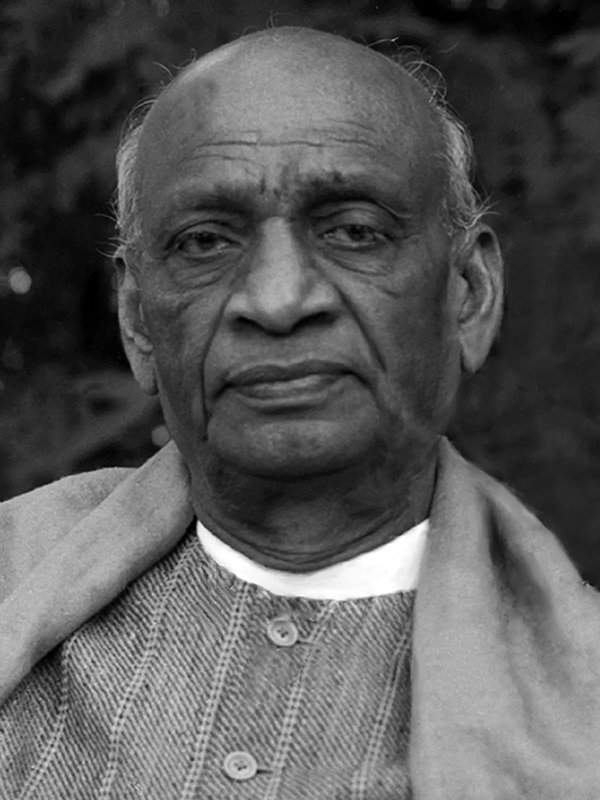The history of India would have been different had it not been for Sardar Patel, the Deputy Prime Minister when India became independent in 1947. Sardar Patel consolidated the country into one united whole in a unique manner. His strength of character, the sharpness of his mind, his organizing skills, and all his energy were offered for achieving the freedom of India and for India's consolidation after independence. We admire a man who rises to a political or financial peak, but are moved by one whose sole purpose in life is the strength and well being of his compatriots. And we are moved even more when we discover that next to the steel in his soul is tenderness for colleagues. In successive phases of his life Sardar Vallabhbhai Patel showed the defiance of the oppressed, a trial lawyer's brilliance, the daring to give up a flourishing career, the discipline of a soldier in the battle for freedom, the strategies of a General , the indifference as a prisoner of the Raj, the generosity of the strong, the firmness of a patriot, and the farsightedness of a statesman. When times are depressing or daunting, Patel reminds us of India’s potential. When times are good, we can think of him with glad gratitude.

Early Years:
Vallabhbhai Patel was born on October 31, 1875 at Nadiad, in the Kaira district of Gujarat. He was the son of Laadbai and Zaverbhai Patel, a simple farmer.
Sardar:
Around 1915, when the Swadeshi Movement was at its peak, Patel started actively participating in it. Around the same time the British government declared to confiscate all the lands of farmers. It was under his sterling leadership and practical vision that the peasant movement in Gujarat became a success and the British government was forced to amend the rules. Due to his exemplary leadership qualities, Sarojini Naidu bestowed him with the title of 'Sardar'.
The Iron man of India:
On the eve of their departure, the British government announced that its rule would lapse not only over the British territory but even over the native States. This meant that like India and Pakistan, as many as 625 small and big native states would become independent. Consequently, the country would be divided into a number of small and big units. Patel did not hesitate in using the policy of ‘Saam-Daam-Dand-Bhed’ (friendship, bribery, punishment and division) for achieving his objective. Such was his resolve and tact that princely states were left with no other option but to merge with India. Basically it was his success in integrating all the princely states after independence, and that too without much bloodshed that got him the sobriquet of ‘Iron Man’.
There is one very interesting anecdote of his childhood which highlights his strength of character. Once, when he was a small boy, Vallahbhai suffered from a boil in the armpit. There was a man in the village who used to cure boils by bursting them with hot iron. As young Vallabh went to him, the man heated the iron rod till it grew red. But he hesitated upon noticing the boy's tender age. "What are you waiting for? The iron will get cold. Hurry up, brand the boil," said the boy firmly.
The man was even more frightened. Then the boy himself picked up the glowing rod and burst the boil. Those who watched him were shocked and screamed. But there was not even a trace of pain on the boy's face.
Dedication:
In 1909, Patel's wife Jhaverba was hospitalized and was to undergo a major surgical operation for cancer. Her health suddenly worsened and despite the successful emergency surgery, she died in the hospital. Patel was cross-examining a witness in court when he was given a note informing him of his wife's demise. According to those who witnessed, Patel read the note, pocketed it and continued to intensely cross-examine the witness and won the case. He broke the news to the others only after the proceedings had ended.
Awards and commemorations:
Sardar, who passed away on 15th December 1950 was posthumously awarded the Bharat Ratna. He is also remembered as the ‘Patron Saint’ of India’s civil servants for establishing modern all-India services. An annual commemoration of Patel, known as the Rashtriya Ekta Diwas (National Unity Day), was introduced by the Government of India in 2014 and is to be held annually on his birthday, 31 October.
At the age of 36, Patel journeyed to England and enrolled at the Middle Temple Inn in London. Finishing a 36 month course in 30 months, Patel topped his class despite having no previous college background.